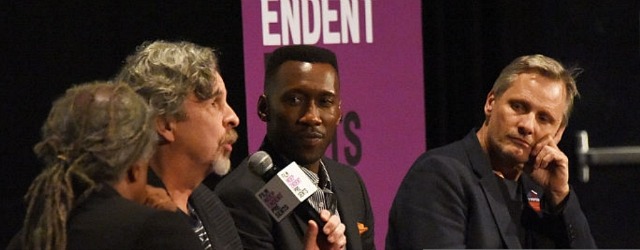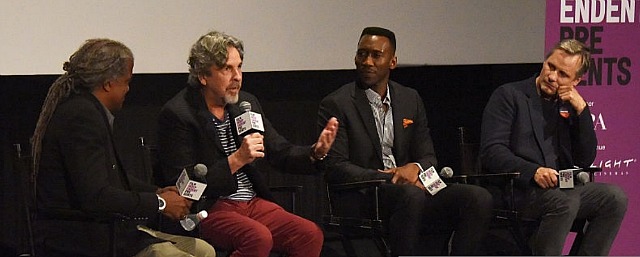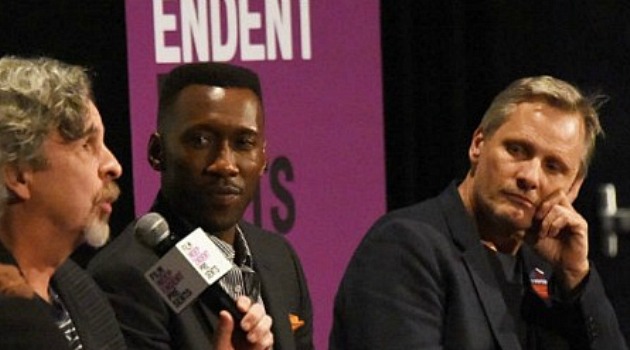From sea to shining sea and even in the rural, red-state regions, there’s a rule that everyone understands and lives by. You can use the term “the N word” but never the word itself. Because verbalizing that term, even for an instant, somehow bestows a brief spurt of cultural oxygen, and the rule is that this term must be kept in an airless, vacuum-sealed box inside a concrete underground bunker, never to be exhumed. Which is clearly how it should be.
The night before last Green Book costar Viggo Mortensen, participating in a Film Independent discussion at the Arclight, said the actual, two-syllable N word. I strongly doubt that anyone suspects Mortensen, a gentle, thoughtful, well-liked guy occasionally given to long-winded explanations of feelings and undercurrents, of even being an unconscious R-word person. He just said a stupid thing. Viggo has thoroughly apologized (“I will not utter it again”), but this was a lulu of a verbal blunder.


I hate to say this — I would certainly like to imagine otherwise — but Viggo may have possibly torpedoed his chances of winning a Best Actor Oscar. Or maybe not.
I think people should consider that many actors, especially the brilliant ones, have a naturally open, expansive, dig-down-to-the-bottom-of-things nature, and that Viggo’s instinct to be vivid and/or dramatic briefly overcame his sense of social decorum. Has anyone out there ever blurted out some crude, outre expression for the sake of dramatic emphasis, and then immediately realized that too much emphasis was used? That’s all that happened here — an actorly instinct collided with a strict social taboo.
In a statement given to The Hollywood Reporter‘s Scott Feinberg and Gregg Kilday, Mortensen said the following: “In making the point that many people casually used the ‘N’ word at the time in which the movie’s story takes place, in 1962, I used the full word. Although my intention was to speak strongly against racism, I have no right to even imagine the hurt that is caused by hearing that word in any context, especially from a white man. I do not use the word in private or in public. I am very sorry that I did use the full word last night, and will not utter it again.”
Mortensen added, “One of the reasons I accepted the challenge of working on Peter Farrelly’s Green Book was to expose ignorance and prejudice in the hope that our movie’s story might help in some way to change people’s views and feelings regarding racial issues. It is a beautiful, profound movie story that I am very proud to be a part of.”
Film Independent member Dick Schulz, who attended the q & a before speaking to Feinberg and Kilday: “It was all anyone was talking about when we left the theater. I was hearing everybody passing by me going up the stairs going, ‘That was crazy! Why did he say that? You cannot say that!’ And it’s sad because the movie is great. The irony is confounding, to be honest — it’s really shocking, and it was really shocking in the moment.”
According to Schulz, Viggo said, ‘I’m gonna go off on a tangent here, but it’s important, and I don’t like saying the word, but, for instance, people don’t say’ — and then he said the n word in its entirety — ‘anymore,’ and you could just feel the room immediately tense up. And the craziest thing was they had just talked about body language, so I felt like everyone was really attuned to body language, and everyone’s body language on the panel immediately tensed up.”
“I think that he immediately regretted it. He went on for I don’t know how long it was — it felt like an eternity after that, because everyone was waiting for the answer to end, but he was trying to steer the ship back to where he was trying to go.”
A friend has written the following: “Stick a fork in it — Viggo will not win now, and Green Book will not win.” That is obviously a stupid over-reaction, but this is what some people are like. They sometimes think and act rashly if someone violates a social rule. Rather than say ‘uh-oh, he shouldn’t have said that’, they say ‘off with his head! kill all his babies! burn down his house!”

